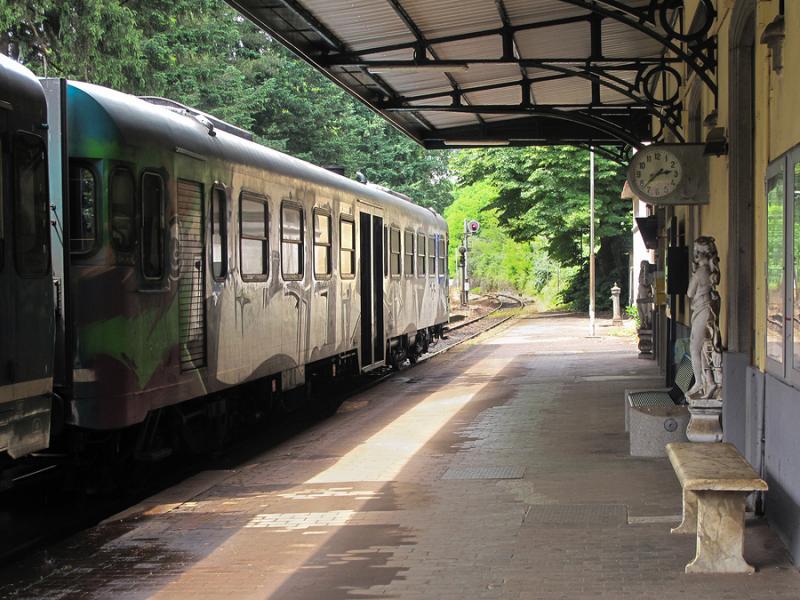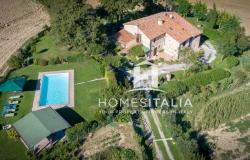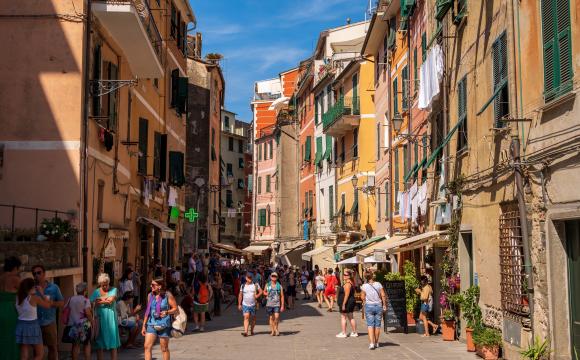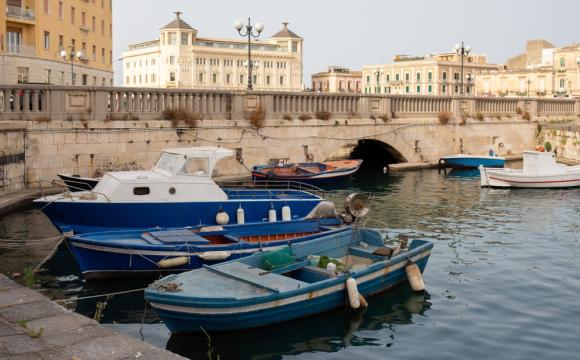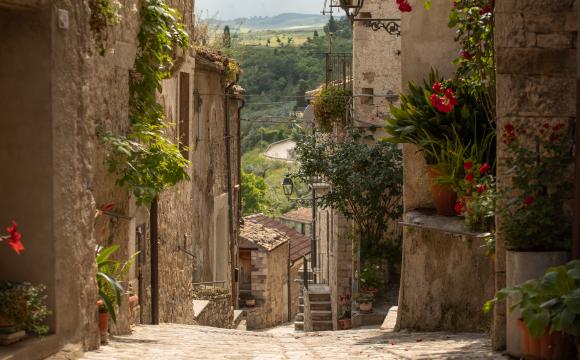In our previous articles, we’ve learned how to conjugate Italian verbs ending in –are and ending in –ere, and have reviewed their regular and irregular forms. This time we’re going to look at the verbs with an infinitive ending in –ire and their conjugation.
Regular -ire Verbs
Let’s take two Italian verbs like “partire” and “finire”. Though these verbs are both regular, their conjugation patterns are not the same. Let’s see the differences:
Partire [par-tee-reh] – to depart, to leave
We take off the –ire ending and add:
| (io) part-o | I leave/am leaving |
| (tu) part-i | you leave/are leaving |
| (lei/lui/Lei) part-e | she/he leaves/is leaving |
| you (formal) leave/are leaving | |
| (noi) part-iamo | We leave/are leaving |
| (voi) part-ite | you leave/are leaving |
| (loro) part-ono | they leave/are leaving |
The stress is on the first syllable in the first three persons of the verb. It is on the “a” of the ending in the “noi” form, the “i” of the ending in the “voi” form, and the first syllable in the “loro” form.
Venerdì prossimo parto per la Sicilia. – Next Friday I’m leaving for Sicily.
A che ora partite domani? – What time are you leaving tomorrow?
Now, we do the same with the verbs dormire [dor-mee-reh] (to sleep) and aprire [ap-ree-reh] (to open).
| (io) dormo | I sleep |
| (tu) dormi | you sleep |
| (lei/lui/Lei) dorme | she/he sleeps |
| you (formal) sleep | |
| (noi) dormiamo | we sleep |
| (voi) dormite | you sleep |
| (loro) dormono | they sleep |
| (io) apro | I open |
| (tu) apri | you open |
| (lei/lui/Lei) apre | she/he opens |
| you (formal) open | |
| (noi) dormiamo | we open |
| (voi) dormite | you open |
| (loro) dormono | they open |
Gli telefono dopo, a quest’ora dormono. – I’ll call them later, they’re sleeping now.
Ultimamente non dormo bene. – I don’t sleep well lately.
Fa caldo! Apriamo la finestra? – It’s so hot! Let’s open the window.
There is a second set of –ire verbs like finire (to finish), capire (to understand), preferire (to prefer) that take the following endings:
- isco
- isci
- isce
- iamo
- ite
- iscono
Do you remember the pronunciation of these particular combinations of letters? In the first and the last case, the “c” is pronounced like [k]; in the second and in the third case, it sounds like [sh].
Finire [fee-nee-reh] – to finish
| (io) finisco – I finish | I finish |
| (tu) finisci – you finish | you finish |
| (lei/lui/Lei) finisce | she/he finishes |
| you (formal) finish | |
| (noi) finiamo | we finish |
| (voi) finite | you finish |
| (loro) finiscono | they finish |
Capire [ka-pee-reh] – to understand
| (io) capisco | I understand |
| (tu) capisci | you understand |
| (lei/lui/Lei) capisce | she/he understands |
| you (formal) understand | |
| (noi) capiamo | we understand |
| (voi) capite | you understand |
| (loro) capiscono | they understand |
Quando finisci di lavorare? – When do you get off work?
Il film finisce alle 10 di sera. – The movie finishes at 10 o’clock in the evening.
Mi scusi, non capisco l’italiano. – Sorry, but I don’t understand Italian.
Mi capite? – Do you understand me?
How do you know which set of endings a verb takes? A good dictionary should give you an indication if the verb works like partire or like finire. Otherwise, as with everything else, you learn as you go along!
Irregular –ire Verbs
Just like with the Italian verbs that end in –are and –ere, the -ire verbs can be irregular. As we already know, irregular verbs don’t follow the same rules of conjugation and have to be learned by heart. Luckily, there aren’t many of them. Let’s see how to conjugate some of the most frequently used irregular verbs ending in -ire:
Venire [ve-nee-reh] – to come
| (io) vengo | I come/am coming |
| (tu) vieni | you come/are coming |
| (lei/lui/Lei) viene | he/she comes/is coming |
| you (formal) come/are coming | |
| (noi) veniamo | we come/are coming |
| (voi) venite | you come/are coming |
| (loro) vengono | they come/are coming |
Vengo spesso qui quando voglio rilassarmi. – I often come here when I want to relax.
I tuoi amici vengono con noi al lago? – Are your friends coming with us to the lake?
| (io) esco | I go out |
| (tu) esci | you go out |
| (lei/lui/Lei) esce – she/he goes out | she/he goes out |
| you (formal) go out | |
| (noi) usciamo | we go out |
| (voi) uscite | you go out |
| (loro) escono | they go out |
Salire [sa-lee-reh] – to climb, to go up
| (io) salgo | I go up |
| (tu) sali | you go up |
| (lei/lui/Lei) sale | she/he goes up |
| you (formal) go up | |
| (noi) saliamo | we go up |
| (voi) salite | you go up |
| (loro) salgono | they go up |
Usciamo stasera? – Should we go out tonight?
Ho freddo. Salgo a prendere la giacca. – I’m cold. I’m going upstairs to get a jacket.
Practice Your -ire Verbs
Now see if you can insert the verb correctly in these sentences. We have indicated the “–isco” type of verbs that work like finire.
There’s no reason to fear Italian verbs ending in – ire! It may seem like a lot of work to get the hang of them at the beginning, but if you practice, their conjugation gradually becomes automatic. In moments of doubt, you can always look up the verb in a dictionary or ask an Italian about the correct conjugation.
Keep reading our weekly language articles to learn more about Italian grammar and how to apply it in everyday situations!
(Note: This article was originally written for Italy Magazine by Pat Eggleton on July 5th 2010. It has been updated and expanded.)
